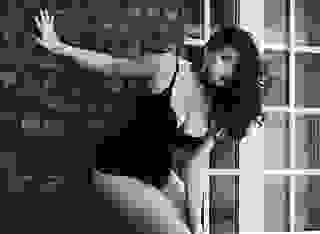- Erotic Horror
- Devil Box
- Page 2
Note: You can change font size, font face, and turn on dark mode by clicking the "A" icon tab in the Story Info Box.
You can temporarily switch back to a Classic Literotica® experience during our ongoing public Beta testing. Please consider leaving feedback on issues you experience or suggest improvements.
Click here"Are you finally taking it then?" she said after a while.
"It's not my place to have it."
"Strange thing to buy then."
"I had my reasons. And you won't agree to help me until you know what they are, will you?" Although Taph sat facing him, he was looking away—at the box in his lap, or perhaps over the edge of the rooftop again, so that his face was in profile against the light reflecting off the glossy black windows of the building next door. Even in the dark, she could make out most of his expression: open, vulnerable, guileless. She couldn't remember the last time she met someone so shamelessly transparent. He really is quite handsome, she thought without meaning to.
Clearing her throat, she said, "Mr. Weyer, you want to buy my help—I'm happy to sell it. But I've got to understand what you're really asking me for. So what's it going to be: Fill me in, or is this the end of our dealings?"
Rather than answer directly, Weyer took a single sheet of paper out of his pocket, unfolded it neatly—it was entirely blank, she saw—and laid it on top of the box. With his other hand he began rubbing a piece of colored wax across it, keeping his eyes assiduously on his work as he talked.
"You've heard of Solomon?" he said.
She blinked. "From the Bible?"
"The Talmud. He was the king of Israel, the son of David. One of the 48 true prophets. A wise man, a good man."
"Kind of a louse, if I remember."
"Nobody's perfect. A story they don't tell you in the Talmud—or the Bible—is about Solomon's ring: It was a gift from the archangel Michael, and with the seal Solomon could impress and command all manner of demons. All the way up to the very kings of Hell themselves, they all did his bidding."
"Like what?"
"Anything he liked: reveal the secrets of the universe, tell him where treasure was, teach him art, history, geometry—sciences far beyond that age, you understand. He forced them to build his great temple—the First Temple, in Israel, the most beautiful temple, before it was destroyed. And he'd send them on lesser errands too—capturing runaway virgins, for example. All because of the power of that ring and seal. This seal."
He held up the paper, where the wax rubbing revealed—what was it? The surface of the box was so old and faded that it was almost impossible to tell, and yet, with Weyer's help, she swore she really DID see a symbol there, with a six-pointed star in its center.
"Of course, no good could come of such things. Eventually, Asmodeus, greatest of the demon kings, stole the ring, and with its power he ruled the world. It only took Solomon 40 days to steal it back. But in even that much time, the damage done—awful, awful. So to make up for his hubris, Solomon took the 72 most powerful, most prideful, and most troublesome demons in the universe, and he imprisoned them."
Here Weyer paused, and then with just the tips of his fingers he hefted the container on his lap.
"In this box. Where they are still."
He paused again, just long enough to take a breath before adding, "And where they're meant to remain forever."
Taph waited for the rest. Nothing came. Now Weyer's face was in shadow, and impossible to read. She felt a laugh coming on, but when she opened her mouth it was just a small thing, barely louder than a cough. Then she said:
"You're not serious."
"I'm never not serious."
"This isn't a con?"
"I'm never conning either. My entire life I've only even told a lie once; I wouldn't add this one on now. This is the vessel into which Solomon conjured the 72 high demons. Here, you can still feel the engravings around the lid with the true names of each of them."
Without warning, he took her hand and guided it to the spot he meant. There WAS engraving there, though she'd never noticed it before, circular symbols, their interiors filled in with mysterious, sinuous lines and whorls that had almost but not quite completely faded away...
They sat like this for sometime, the box between them, their fingertips touching. In spite of herself, Taph felt a frisson of excitement. "What makes you sure that this is the one?"
"Partly that I've seen and held and in some cases bought all of the others that anyone ever claimed were the right one, and none of them were. But mostly it's other things: the age, the craftsmanship, the million tiny variables, like a fingerprint or a melody—difficult to describe, but unmistakable. I think—I know—that this is it. How your father came to have it—but he couldn't have known what it really was, could he?"
This thought Taph pondered in silence for sometime. Then another thought occurred to her: "Wait. You said you want me to destroy it?"
"I do. Through very particular means, the only ones that will be effective."
"And that will, what, destroy the demons?"
"Of course not. If they could be destroyed, why would Solomon have settled for merely imprisoning them?"
"I don't understand?"
"Be that as it may, now you know everything. Or everything that you're going to find out, at any rate."
He let go then, and retreated—not just drawing his hands away from the box but, seemingly, retracting his entire body deeper into the shadows. Taph longed to see his eyes and gauge what he must be feeling. But she was left staring into nothing at all.
His voice sounding polite but constrained, he said, "So now you know. And you know how much I'm willing to offer if you'll help me. The only question is: Will you?"
The box sat on Taph's lap again. She traced the indecipherable symbols around the edge of the lid. It seemed much heavier now than it had before. In fact, she was amazed that she could lift it at all. She had another frisson, but not one of excitement. The chill she felt was much colder and much deeper now.
Realizing that her mouth was too dry to speak, she drained her glass, and then crushed the ice between her teeth. The sharp, shocking coldness on her tongue revived her blood flow and broke some of the spell that Weyer seemed to have cast on her. Licking her lips to wet them, Taph said, "I...need to think about it."
"Of course."
"In the meantime, you said there was something special about the way it had to be done? Something that needs preparation?"
"Yes."
"Send instructions then. I'm not saying I'll do it; but give me some idea of what the necessaries would be."
"Of course."
"And you still don't want to keep the box for yourself?" The shadow that was Weyer shook its head again. Putting it back into her bag, Taph nodded. "I'll hold onto it. Until...until we know what's going to happen, I guess."
"Until then," he said.
And she left.
***
It was another two weeks before they met again, and this time she said to come to her place.
She rented a live/work in an old factory on Bryant Street, with high ceilings and only a few neighbors. A spot that should appeal to his predilection for privacy—or solitude.
"I've decided," she told him over the phone. "I'll do it."
"How much do you want?" Weyer asked, but Taph wouldn't discuss payment over the phone. He'd have to come to her if he wanted to seal the deal—fair's fair, after she came at his beck and call twice in a row.
So now she waited for him, not allowing herself to acknowledge how much she anticipated his arrival. An old freight elevator serviced the building, but Taph always took the stairs herself. Now when she heard the aged cables grind to life she sat up a little straighter and did breathing exercises to slow her rapidly beating heart.
The old doors clunked open and Weyer's footsteps—hesitant, it seems, clicked on the cement corridor leading up to her front door. He came in without knocking, or even announcing himself. Taph sat on the edge of the chaise with her hands clasped on her knees and smiled as wide as she could when he came in. His return smile looked a little weak.
"I'm glad you came," she said, taking his hand and leading him further in. The Oriental rugs covering most of the floor muffled their footsteps; only about a third of the lights were on, and she'd drawn shutters over the floor-to-ceiling windows, leaving much of the apartment clothed in shadows.
"I admit had to give it some thought," Weyer said, his voice tight.
Taph paused. "I thought you'd be happy," she said. "You were pushing pretty hard for this."
"Happy, yes," Weyer said. "Of course. But it's hard too—there's been a lot leading up to this. A lot of decisions to make, difficult things that had to be done. Now that it's all about to be over, it's hard to know how to feel."
"I know what you mean," Taph said. "I guess it must be the same as when I decided to sell Dad's collection. I was happy to be rid of it, but at the same time, anything you put that much time and emotion into, it's going to leave its mark on you."
"Yes," said Weyer, "that's it precisely." And then he paused as he looked around fully for the first time. "What is all of this?" he said.
The back half of the main room had three long, heavy tables positioned around its perimeter, and laid out on them, in row after row, were all manner of strange things: jewelry, staves, vases, urns, mummified animals, jars and bottles of perfume and incense and oil, ancient candles, forgotten bones, reliquaries, ceremonial knives, handbells and chimes, robes and chasubles, pages and fragments of old manuscripts protected under glass, and scrolls so old that to unfurl them would risk breaking the entire thing into pieces with just the weight of your fingers.
Many things that hadn't seen the light of day in decades—or centuries.
The center of the room was empty except for another old rug on the floor, and, in the middle of it all, the box.
But for once Weyer hardly seemed to pay it any mind, as he paced along the tables' edges and looked over the assembled artifacts, holding his breath. "Where did all of this come from? Your father?"
Following after him but making sure to give him space, Taph shook her head. "A little bit of it, yes. The best parts of Dad's collection I did keep for myself. But mostly this is my own—you wouldn't believe how many years it's taken, or how much money."
"I suspect I probably would," Weyer said. As usual he was not bragging, just unaware seemingly of the implications of what he said. "You never mentioned you shared your father's taste for...esoterica."
"I didn't. Dad's stuff was junk. Mostly junk. 'Weird shit' I always called it—that made him mad. We fought a lot because I didn't respect his taste, and he didn't think much of mine either."
Weyer had reached a certain spot, right in front of a ceremonial mask made out of beaten bronze. "I saw your father's other items in the auction catalog, and I was very impressed. He had a good eye, and he kept everything in wonderful condition."
Still keeping her distance, Taph crossed her ankles and leaned on he edge of a different table. "A good eye, yes," she said. "And he made good deals; drove a hard but fair bargain; always kept his word; handled relics responsibly, restored them beautifully; and he was a dedicated historian. I've never said otherwise.
"But what he didn't have was courage. He stuck to rules written by cowards. He would never have bought this, for example," Taph said, taking a jar made out of black glass from the table behind her and, with a little tap, unsealing the lid. "And he wouldn't have been willing to bring you here. In fact, he'd have done anything to stop me, if he was around."
"Why...why can't I move?" Weyer said. Suddenly he was sweating, and his face looked drawn and panicky. She saw him struggle—visibly struggle—to lift just one foot up. He couldn't.
"Because there's a triangle on the floor, inscribed with the three true names of power—right there, beneath the carpet under your feet," she said. "And there's a black circle draw in the center of that triangle, that you stepped right into it without noticing. That's the one thing about you, Weyer: You're sloppy."
"Release me."
"When the time comes," Taph said. "Like I was telling you, Daddy disapproved of the way I did business. And the people I bought from. And most of all my plans for the future. But none of that matters now."
Seeing him strain, Taph continued, "And now you're trying to do something horrible to me, no doubt. But under my feet is a circle, ringed with the ouroboros and inscribed with the sign of the hexagram, the alpha and the omega, and around its edge the sacred names, from EYEH to LEVANAH. So you can't harm me. You can't see it, but the edge of the circle is right here; if I put just a toe over that line...well, that's not going to happen."
"Release me!" Weyer said again, and now his voice was electric with rage.
"Oh John—poor, silly John. You asked me what my price was, and I guess it should be obvious now: The only thing I want is you."
Now she dipped her hands into the black jar, rubbing the sandy granules inside with the tips of her fingers.
"But first, let's get a really good look at you," she said. And with one quick motion, she threw the sand in Weyer's face.
It wasn't sand at all really, but ashes—ashes from the sacrificial fires burnt on the altars of Ba'al Hadad and Ba'al Hammon countless generations ago, fires that had leapt up all the way to the heavens. So potent had they been that even now, millennia after they'd burnt out, they still had some trace of their old power.
When just the smallest measure of the substance touched him, Weyer cried out in pain and flung his hands over is face. This didn't protect him, of course—the damage was already done.
As Taph watched, Weyer's figure seemed to shimmer and writhe. And then, horribly, he began to change.
***
The first thing Weyer turned into had the body of a man (nude), but with the head of a great cat, a lion, with its flowing mane, and its pearly white fangs revealed in a carnivorous snarl.
In his hands he carried an angel's trumpet, curved and silver, and he rode on the back of a huge, shaggy black beast with an enormous head—a bear, perhaps. Taph understood that both the mount and the rider were the same creature—a very old trick to confuse the conjurer into believing perhaps she had somehow called up two names instead of one.
Then he changed again, this time taking on the head of an enormous bird—an owl, a raven, or a hawk, from moment to moment—and the bear became a wolf, and the trumpet became a sword, and enormous wings beat from his back with the force of a violent wind.
When that didn't work he instead became a column of flame that howled in a terrifying voice, and behind him appeared a phantasm of a great tower that sprung straight up into the air, its top climbing far beyond the heights of Taph's ceiling.
He became other things too: Weyer again, pleading for help, and her father, admonishing her, and an angel praising her, and all kinds of monsters that screamed, spat, swore, and threatened. But none of these things tricked her into breaking the circle.
When she'd had enough, she held up a card with a symbol on it, a nest of curled lines and hard angles, and at the sight of it the thing in the magic triangle became quiet—docile even. Holding the card higher, Taph said, "That's your name, isn't it—your sigil?"
No answer came, but Taph knew she was right. No demon could resist the image of its true name; she said it out loud, "Andras: Marquis of Hell, sower of discord." And then the creature became the towering fire again, but instead of a roar its voice was the whisper of dying embers.
Between them sat the box—in the light of that hellish flames, it looked not so battered and tarnished anymore, but bright and brilliant, a treasure among treasures. The symbols inscribed on its lid—sigils, just like the ones she'd tamed the demon with—all but glowed.
"Seventy-two of the most powerful, most prideful, and most troublesome demons in the universe," she said. "All of them except for you, right Andras? How did you escape while Solomon trapped all of the others?"
Again the flames sizzled and spit instead of answering, but when Taph held the sigil forth again the spirit became tame and said, "I lied."
Nodding, Taph said, "That's right, you told me before: You've only ever lied once in your whole life. But it was a doozy, wasn't it? You gave Solomon a different demon—Pruflas—and he took your place in the box instead. I guess he's still in there. Can he hear us, do you think? Is he angry?"
"Release me," said Andras once more.
Shaking her head, Taph said, "We still have a deal to make. You DO want me to destroy the box, don't you?"
The flames grew very quiet.
"I'm curious why though: They're inside, you're out here, seems like a pretty good deal for you. What's in it for you letting them go?"
"The world's grown dull without them," the flames said. "I want to see what they'll do in this new age. Besides, all of them will have to repay me for helping them: a boon from each of the greatest princes of Hell."
Yes, Taph said, that would be worth almost any price. "But you can't do it yourself—anymore than you can step out of that triangle, or cross the line of the magic circle. You need me. And all of that power must be worth an awful lot to you."
"What do you want?" the fire said.
"Like I said: you."
"I'll be no one's slave," the demon said.
"I don't need you forever," she said. "Just for a night..."
A pause now. "What do you mean?"
"I told you when I first met: What I really want is to start a family. I just needed to meet the right person."
No response again. Taph could almost hear the workings of that ancient mind turning over and over. A flash of impatience struck her and she said, "You can do that, can't you?"
"Yes," said the voice. "But you know what it would mean: the Nephilim..."
"That's for me to worry about," Taph said. "Do we have a deal? Or don't we?"
Her heart was racing. She knew she'd done everything correctly: evoked the demon, subdued him with his own name. And she knew that whatever arrangement they made now they would be binding for them both. Still, how could she not feel some uncertainty—fear, even?
At long last the voice said, simply, "Yes," and with that she felt the knot of tension break and she knew that she had won.
Daring to cross the line of the magic circle, Taph stepped out and walked right up to the place where the demon stood. And then, consciously and deliberately, she plunged her hand into the column of fire, stretching her arm all the way out in spite of the awful heat, until she felt a hand take hers. And then she pulled—
And Weyer stumbled out of the sacred symbol, free again. His hair was a mess and his clothes disheveled, and his face was pale and sweating, but other than that he looked very much the same as he had before.
Taph's hand hurt, but only for a minute. When she looked at it she saw that it wasn't really burned at all, and the pain faded as if it had never been.
Weyer looked like he was in shock—he tried to say something but couldn't seem to push words out of his mouth. He looked and seemed like himself again—but just what did "himself" mean at a time like this? She imagined she'd never really know.
Putting a finger to his lips, she staunched his attempts to speak. Then, taking both of his hands in hers, she walked backwards and dragged him toward the staircase, up to the loft where her bed lay waiting.
"I've been waiting for this for a long time," she told him in the darkness of the stairwell. He remained mute; ever the man of mystery, she thought. At first she was afraid he wouldn't go along with it, but once she pulled him up for a kiss—for a moment fear welled up inside of her, briefly unsure of what might happen once she crossed this threshold—he seemed to respond in kind.
They fell over each other, kissing, touching, feeling. Taph landed on the bed and Weyer landed almost on top of her. She coiled around him, arms and legs wrapped tight about his body, lips locked against his. Is it really happening, she thought? Is this a dream? She ran her hand over the deceptive smoothness of Weyer's tensed body. It felt real enough.








